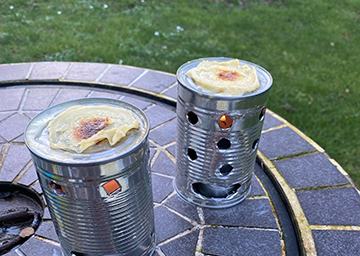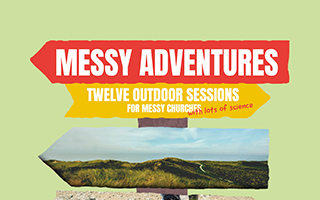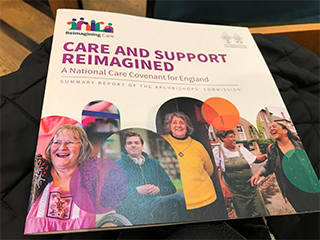For our new series of articles we’ve asked people from each of our four ministries to share their Lent preparations and practices. First up is Aike Kennett-Brown, our Messy Church lead, who is going to be experimenting with tin can pancakes.
29 January 2023
How I approach Lent…
Hot, delicate, sizzling, flipping, seriously delicious – what am I talking about? Pancakes, of course! How do you like to eat yours? Will you choose traditional lemon and sugar, or perhaps you like your pancakes dripping with mouth-watering maple syrup, or will you add slices of banana, melted chocolate and lashings of squirty cream?
Whether you’re into stacks of American style fluffy pancakes or the traditional French crepe, Shrove Tuesday (coming up on 21 February) wouldn’t be the same without the sound of sizzling pancakes at a Messy Church pancake party.
This year, my Messy Church Goes Wild will gather in an outdoor classroom and attempt to make mini pancakes on top of an up-turned empty tin can that’s been punctured to allow some airflow, powered by a tealight candle.

‘This year, my Messy Church Goes Wild will gather in an outdoor classroom and attempt to make mini pancakes on top of an up-turned empty tin can… powered by a tealight candle.’
I’ve never tried this before, so am a bit apprehensive. One thing I do know is that we’re going to have to cook a lot of them for everyone to get their fill and will probably have to have a back-up plan involving a large pan and a camping stove.
Understanding the tradition
Linking in with festivals is a key way to engage families on the fringe of Messy Church. There’s a desire to mark this tradition, but often there’s little knowledge about why we eat pancakes, or what the phrase ‘Shrove Tuesday’ means.
The word ‘shrove’ comes from the old Roman Catholic practice of being ‘shriven’, meaning to go to confession to be absolved from sins. The shriving bell would be rung on Shrove Tuesday to call people to church. Before Lent could begin in earnest, all fattening ingredients needed to be removed, ahead of 40 days of Lenten fasting, starting the following day on Ash Wednesday.
If you’ve not grown-up within the Christian tradition, there’s plenty to unpack about why Christians ask forgiveness for the things we do wrong (our sins), why pancakes are the item to feast upon and why we might consider fasting and preparing ourselves for 40 days!
‘Linking in with festivals is a key way to engage families on the fringe of Messy Church.’
The issue of why we eat pancakes is easiest to explain. It dates back to the 1400s, when the fattening ingredients most people had in their houses were eggs and milk, two of the three components of pancakes. According to tradition, in 1445 a woman of Olney in Buckinghamshire heard the shriving bell while she was making pancakes and ran to the church in her apron, still clutching her frying pan, prompting the tradition of pancake races.
However, 700 years later, we consider eggs, milk and flour as basic necessities, and are alarmed at the rise in cost of these commodities in recent months. It’s the pancake toppings that we now consider the fattening ingredients, and you might possibly hear one or two people mention they are giving up chocolate or alcohol in the run up to Easter.

‘700 years later, we consider eggs, milk and flour as basic necessities, and are alarmed at the rise in cost of these.’
Adopt a new practice for Lent
Outside the diet industry, fasting is an alien concept in post-Christian 21st-century Britain. We live in a culture where everything is available to us all the time and can be delivered to our homes within minutes of ordering from our phones. Why give this up? Lent is sometimes called the ‘Great Fast’. It’s a period in which Christians have traditionally given up some comfort or adopted some spiritual practice that leads to self-examination, repentance from sin and, ultimately, renewal of the soul, all in anticipation of greater dedication to serving others and God, leading up to the celebration of Christianity’s most important feast day: Easter.
For several years, I’ve taken up a spiritual practice, swapping pancakes for soul food. I set aside my usual Bible study notes and join an online community led by Brian Draper (author of Soulful Nature).
In the days before the pandemic, it seemed quite avant-garde to connect online with people from around the globe. Each of us received a daily email written in real time, encouraging us to breathe, smile and relax, as we meditate on Bible verses, step outside our comfort zones and encounter God through nature, music and poetry, while making connections with news items.
Now it seems the most natural thing in the world to connect virtually with others and journey together towards Easter. As fellow pilgrims, we’re encouraged to respond creatively through journalling, prose, photography or however the Spirit leads. Every few days there’s an opportunity to submit a response and view those of others and be encouraged as we share our God encounters.
‘As fellow pilgrims, we’re encouraged to respond creatively through journalling, prose, photography, or however the spirit leads.’
Habit forming
Each year there’s a different overall theme and spiritual practice to experience. I realise now that the 40 days of Lent are enough time for me to form a new spiritual habit that I continue throughout the year.
I’ve now built up quite a repertoire and have discovered I connect best with God when I’m out in nature. You’ll often find me on my early morning dog/prayer walk in Greenwich Park, walking more slowly, quietly observing God’s amazing creation, pausing by a favourite beech tree and looking at the space between the branches, inviting God to show me the space that I need to open up in my life to allow the Holy Spirit to work through me.

It sounds super spiritual, but in fact it’s simple stuff, about creating simplicity and openness in a busy schedule.
After all the pancakes, I wonder, how will you mark this season of Lent?

Aike Kennett-Brown was appointed ministry lead of Messy Church in January 2022, after having been a longstanding voluntary member of the Messy Church family.

Messy Church Goes Wild is the movement within Messy Church which aims to encourage Messy Churches to meet God outdoors, love the natural world, experience a sense of awe and wonder there, and be more eco-aware in all we do.
The book at the heart of the movement is now available!

Messy Adventures is a project which has been funded by a generous grant from Scientists in Congregations. It is a resource consisting of twelve units of materials to give the most unconfident leader the tools and confidence to take their Messy Church outdoors.

Archbishops’ Commission: Anna Chaplaincy response
This week saw the publication of a major new report from the Archbishops’ Commission: Care and Support Reimagined: A national care covenant for England.
Members of the Anna Chaplaincy team and network were consulted in the course of the Commission’s research and the ministry is mentioned in the summary report as a recent innovation in the field. As part of the process, Bishop James Newcome (cochair of the commission) visited the Anna Chaplaincy work in Kendal, as an example of the way faith communities are providing care and support within their local communities.

There are now ten Anna Chaplaincy Easy Guides, including the two latest titles: ‘Praying with an older person’ and ‘Recruiting and equipping volunteers to build relationships with individual care home residents’.
Anna Chaplaincy Easy Guides offer ideas and inspiration for churches in their work with older people. Drawn from the rich experience of Anna Chaplains across the UK, they provide pointers for getting started in a variety of contexts where older people’s spiritual care is a focus.
BRF congratulates Guidelines contributor Andy Angel on his appointment to the role of director of formation and ministry for the Diocese of Oxford.

We are giving away free copies of the latest edition of Guidelines, which includes Andy’s series on Matthew 15—18.
